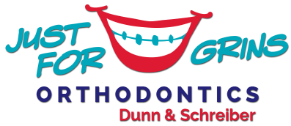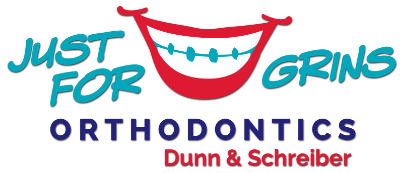Do you feel like your teeth don’t fit together properly? Maybe you find yourself grinding your teeth at night or during the day? You may have misaligned teeth or a misaligned bite!
This is a very common condition we see in new patients. A misaligned bite, or malocclusion, could indicate a crossbite condition, an overbite, underbite, or open bite.
Fortunately, Dr. Dunn and Dr. Schreiber are highly-trained with years of experience treating misaligned teeth and bites! So, you’re in luck—and you don’t have to deal with a misaligned bite for another week. (No, really. We offer Same Day Braces so you can get braces the same day as your first visit.)
Once you visit us for your complimentary consultation, one of our experienced orthodontists will determine whether your jaw is out of alignment and how to fix it.
What causes misaligned teeth?
The primary cause for misaligned teeth is a misaligned jaw. When the jaw is out of alignment, the top teeth and bottom teeth don’t fit together properly, in a healthy alignment. This can cause the teeth to develop in different directions, such as the top teeth fitting behind the lower teeth in a crossbite condition.
Jaw misalignments can either be genetic, or they can develop from harmful habits, like thumb-sucking or tongue-thrusting. They can also develop due to an injury or a health issue like Temporomandibular Joint Disorder (TMD).
In other words, there are plenty of reasons you may have misaligned teeth or a misaligned jaw. No matter the reason though, our orthodontists have your back. (They also have a number of treatment options awaiting you in Montgomery, Millbrook, and Wetumpka.)
How to test if your jaw is misaligned
A clench test is easy to do and can help determine if you have a misaligned jaw. Bite down as you usually would but squeeze your teeth together hard. Consider the sensations in your mouth. Do your teeth feel like a natural fit, or do you notice areas where your teeth don’t make contact?
Do you feel any pain or sensitivity? Are your front bottom teeth pushing hard against the top teeth?
If you answered yes to any of these questions, it’s time to request your complimentary consultation. We’re here to help you live your greatest quality of life with your best smile.
Are misaligned teeth serious?!
Unfortunately, yes. A case of misaligned teeth or jaws can cause some uncomfortable and even painful symptoms.
The alignment of your teeth and jaws affect every part of your life—from your breathing capability to your sleeping quality, your chewing functionality, and your speech. It all depends on your case, though. Everyone’s smile is different.
One person may experience poor sleeping quality due to grinding teeth in their sleep, or narrow airways that make breathing difficult, while another person may only have cosmetic concerns about their misalignment. It all depends!
In some cases, this condition can create oral health problems, such as wearing down the enamel, which leaves the teeth unprotected and prone to tooth decay. A misaligned jaw or uneven bite can wear on your confidence, your health, your capability and disrupt your daily routine!
Misaligned jaw symptoms
Here are a few of the most common misaligned jaw symptoms:
Speaking difficulties
If misaligned teeth are obstructing the tongue, it may cause difficulty speaking. Problems enunciating words or a lisp can indicate a jaw that is out of alignment.
Eating and chewing difficulties
Misaligned jaws or teeth cause uneven pressure throughout the mouth when eating and chewing. This symptom is especially prevalent in people with crossbites, underbites, and open bites.
Challenges with brushing
Crowding or overlapping teeth, caused by misalignments, can make brushing and flossing a lot more difficult than it needs to be. If your toothbrush can’t reach all surfaces of your teeth, food particles left behind can lead to bad breath, tooth decay, and cavities.
Self-Biting
People with a crooked jaw and TMJ issues often bite the insides of their cheeks and tongue. Ouch! Uneven bites may be the source of TMJ, due to excessive pressure caused by the misalignment. Clicking or pain when yawning or speaking are other indications that your jaw is out of alignment.
How to fix a jaw out of alignment
The best treatment route for misaligned jaws and teeth is determined on a case-by-case basis. Every patient is unique. What may be best for one patient may not be the best route for another.
The most common treatments are braces and Invisalign, but depending on the severity of your condition, an appliance or a more intensive treatment may be the most efficient route.
In severe cases of bite misalignment, orthodontic surgery may be recommended.
Either way, you won’t be able to determine the best treatment option until you visit us for your complimentary exam. We’ll thoroughly assess your condition and discuss your treatment preferences to help you make the best decision for your smile.
Still have questions about treating a bite misalignment?
Please don’t hesitate to reach out to us with any questions! We love to hear from you. We’re here to guide you through your treatment process, from your very first visit, to your last appointment.
If you’re looking for a top orthodontist in Montgomery, Millbrook, Wetumpka, we’d love to meet you! Request a complimentary exam for you or your child today.



